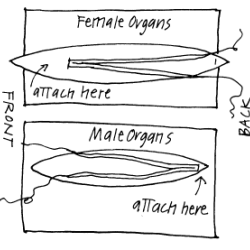Source Institutions
Source Institutions
Add to list Go to activity
Activity link broken? See if it's at the internet archive

In this detailed activity (on pages 9-18), learners investigate the body parts of a parasitic ascaris worm by making and dissecting clay models. Each learner creates a model of either a male or female worm, then they swap models, predict the sex of their new worm, and dissect it to check their prediction. Labels are provided for marking the parts of the dissected models. The activity introduces learners to the structure and function of digestive and reproductive organs of organisms that can live in the human body and cause disease.
- 10 to 30 minutes
- 1 to 2 hours
- 1 cent - $1 per student
- Ages 8 - 14
- Activity, Model
- English, Spanish
Quick Guide
Materials List (per student)
- a handful of clay (nonhardening modeling clay or Play-Dough)
- dissecting needle or plastic knife
- scissors
- string in one color and thread in another
- tape
- toothpicks
- cardboard or stiff paper sheet, at least 9 x 12 inches
- plastic bag to store clay
- centimeter ruler
Subjects
-
Life Sciences
-
Diversity of Life
- Animals
-
Human Body
- Digestion
- Health and Nutrition
-
Diversity of Life
Informal Categories
- Animals
Audience
To use this activity, learners need to:
- see
- touch
Learning styles supported:
- Involves teamwork and communication skills
- Involves hands-on or lab activities
Designed specifically for
- Rural dweller
Culture, ethnicity, and gender
-
Girls
- Explicity developed for this group
Other
Foreign language versions of this resource:
Components that are part of this resource:
Includes alignment to state and/or national standards:
This resource is part of:
Access Rights:
- Free access
By:
Source Collection
- Science After School Consumer's Guide
Rights:
- All rights reserved, University of Nebraska State Museum, 2001
Funding Sources:
- NSF Informal Science Education Program, 9909496
- Howard Hughes Medical Institute
